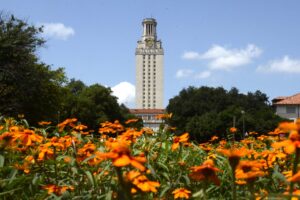The Division of Housing and Food Service (DHFS) has been doing its part over the past year to help the local economy and support farmers by bringing farm fresh produce to residence hall dining rooms every week.
DHFS and its chefs will provide a taste of the local food it serves on Oct. 24 during the UT Sustainability Network’s first campus sustainability day from 11 a.m.- 1 p.m. on the East Mall.
The event, part of National Campus Sustainability Day, supports and promotes sustainability activities across the university.
DHFS started buying locally grown farm fresh produce from Sustainable Food Center’s Farm Direct program in fall 2006 when DHFS Associate Director Scott Meyer heard about the opportunity from a friend at Seton Hospitals who was already working with the center. Most of the produce comes from Naegelin Farm in Lytle, just southwest of San Antonio. The farm annually produces more than 30 different crops all grown using sustainable methods.
“Our decision to bring in local produce is all part of the sustainability movement,” Meyer said. “I thought it was the right thing to do.”
Since partnering with Sustainable Food Center the university has purchased nearly $20,000 in fresh fruits and vegetables directly from local family farmers and served 12,500 pounds of locally grown foods through five dining locations.
The local produce is available at dining halls in Jester Center, San Jacinto Residence Hall, Littlefield and Kinsolving dormitories. Items frequently served include sweet potatoes, tomatoes, squash, onions, zucchini and cucumber.
“We offer Farm Direct food items every Wednesday, local sweet potatoes twice a week and sometimes feature special items from local farms on other days,” Meyer said. “It depends on what’s available, the amount and quantity.”
DHFS is planning a local harvest dinner the week of Oct. 22, providing all local food, not just produce. The menu includes bison lasagna, roasted chicken quarters, green chili and cheese quesadillas, pecan pie and Blue Bell ice cream.
Right now there isn’t a vehicle for DHFS to offer local food all the time due to the amount it needs for all the dining halls and laws requiring it to purchase from sellers with full liability insurance, something many farmers don’t have.
But they are off to a good start, Meyer said.
“You start with something you know you can accomplish,” he said, “and then you get others to buy into it and build it from there, taking small steps at a time.”
Meyer is always looking for ways to improve the dining experience at the university.
“Berkeley offers an all-organic salad bar,” he said. “We aren’t there yet but we are constantly changing and improving and working to stay on then cutting edge.”
The only drawback to purchasing local food is its expense, costing the university 30-40 percent more than produce that isn’t local.
In addition to offering local food, DHFS does many other things to create a more sustainable campus, including providing convenient recycling, switching to energy-efficient micro-fridges in dorm rooms and changing 90-95 percent of its lighting to fluorescent bulbs.
“We want to put the message out there that sustainability is important to UT and mother earth and we need help as we move forward with our efforts,” Meyer said.



